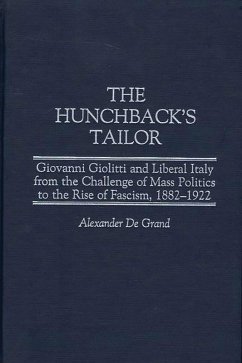Alongside Georges Clemenceau and David Lloyd George, Giovanni Giolitti (1842-1928) stands out as one of the major liberal reformers of late 19th- and early 20th-century Europe. In the first complete English-language study of Giolitti, De Grand examines the political life of Italy's most notable prime minister after Cavour. Giolitti emerges not as a transitional figure leading fledgling Italy into modern democracy, but as a staunch adherent of 19th-century elitist liberalism trying to navigate the new tide of mass politics. De Grand's careful research offers valuable insight into Giolitti as statesman and, through him, a vantage point on the development of Italy during a critical period. Giolitti's troubled relationship with mass politics defined his years in office. A life-long bureaucrat aloof from the electorate, Giolitti introduced near universal male suffrage-even while commenting that first teaching everyone to read and write would be a more reasonable route-and tolerated labor strikes. Rather than reform the state as a concession to populism, however, Giolitti sought to accommodate the politics of the piazza under the roof of liberal parliamentarianism, first in his pursuit of coalitions with Socialist and Catholic groups, and finally, at the end of his political life, in a failed courtship with Fascism.
Bitte wählen Sie Ihr Anliegen aus.
Rechnungen
Retourenschein anfordern
Bestellstatus
Storno









